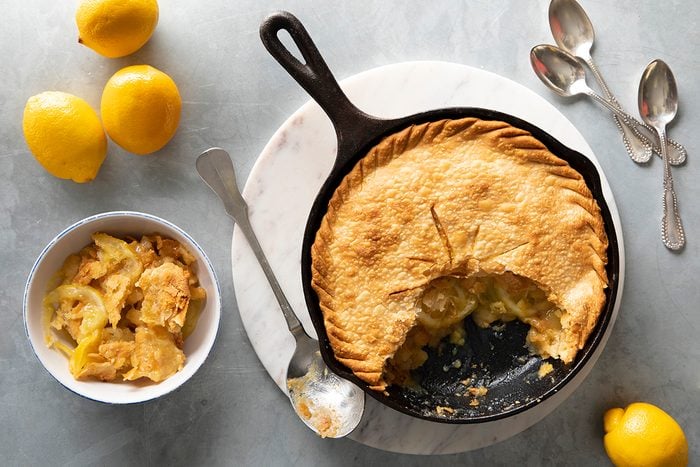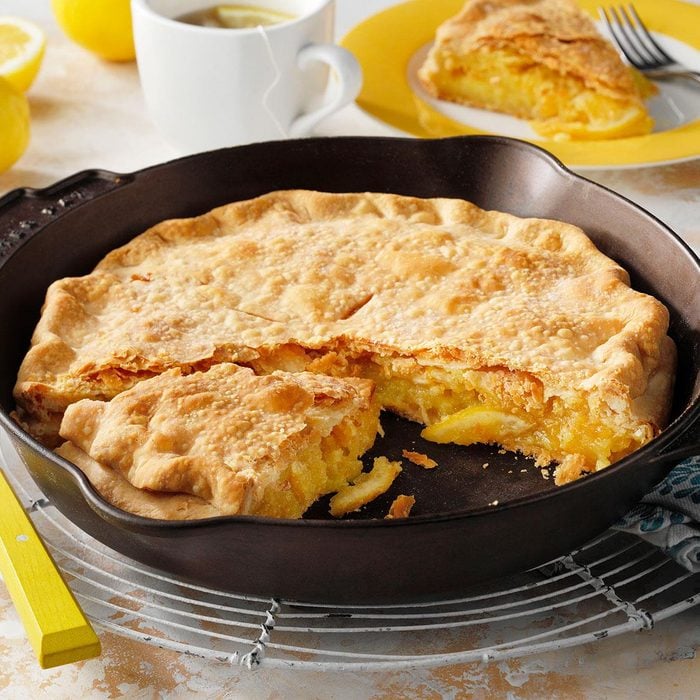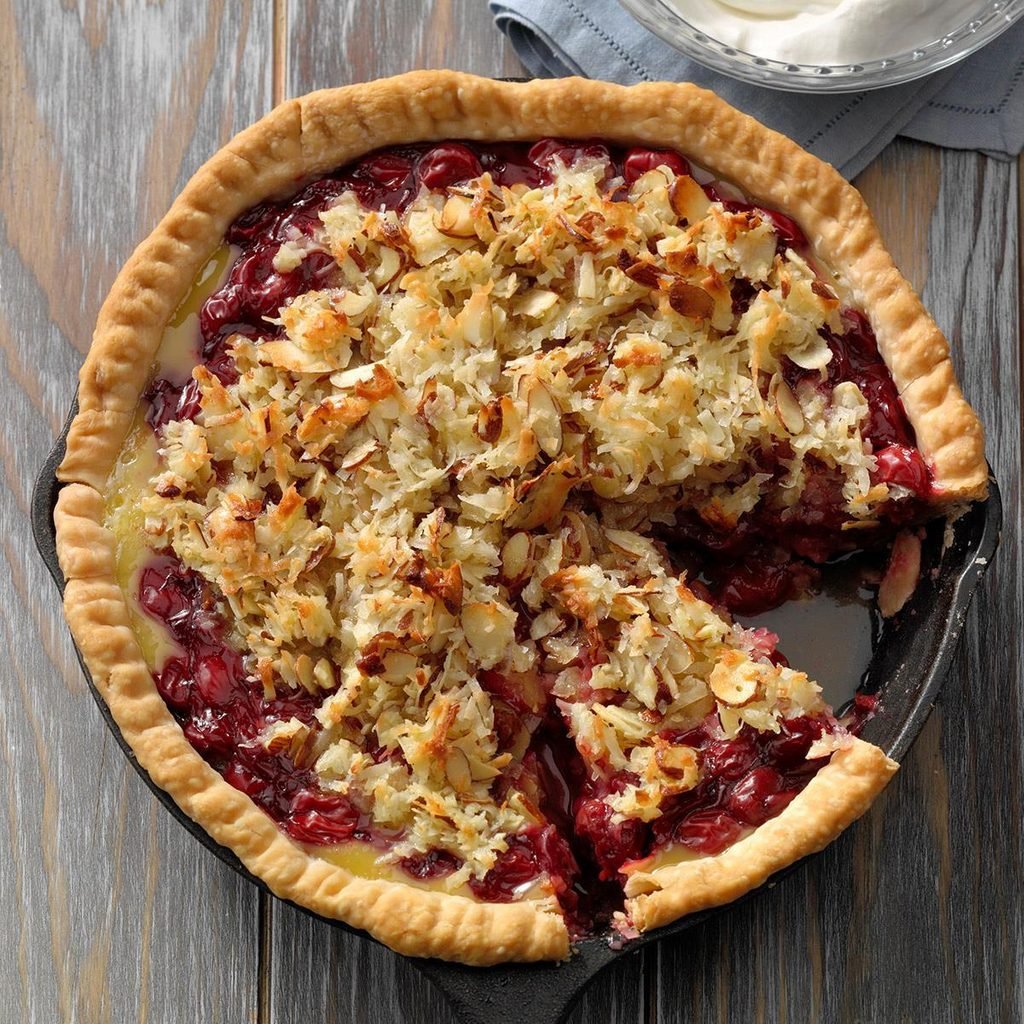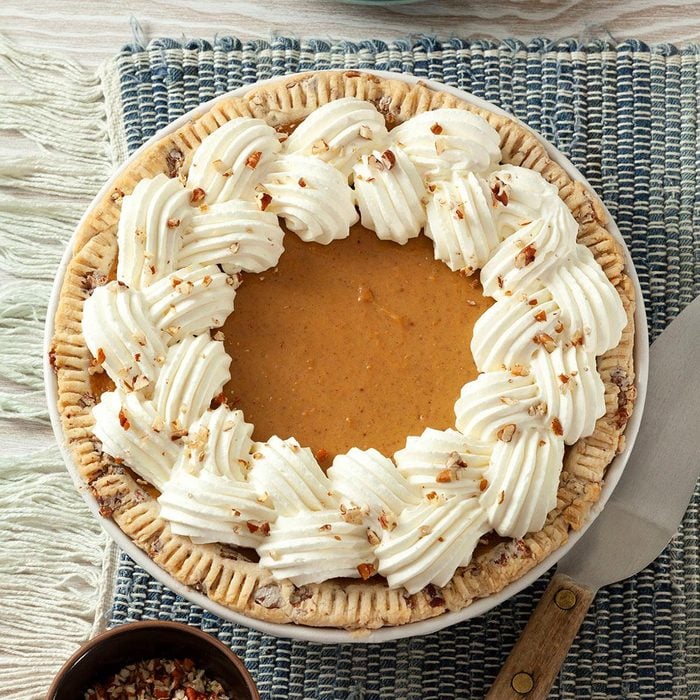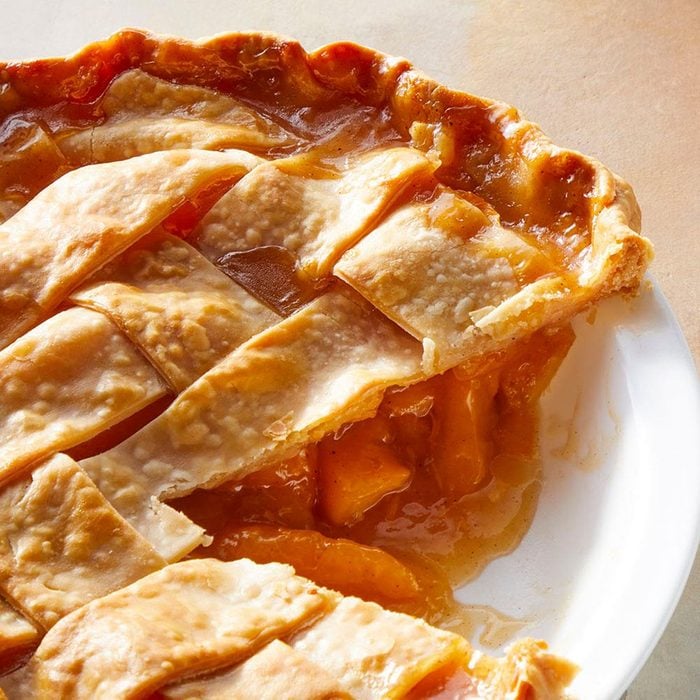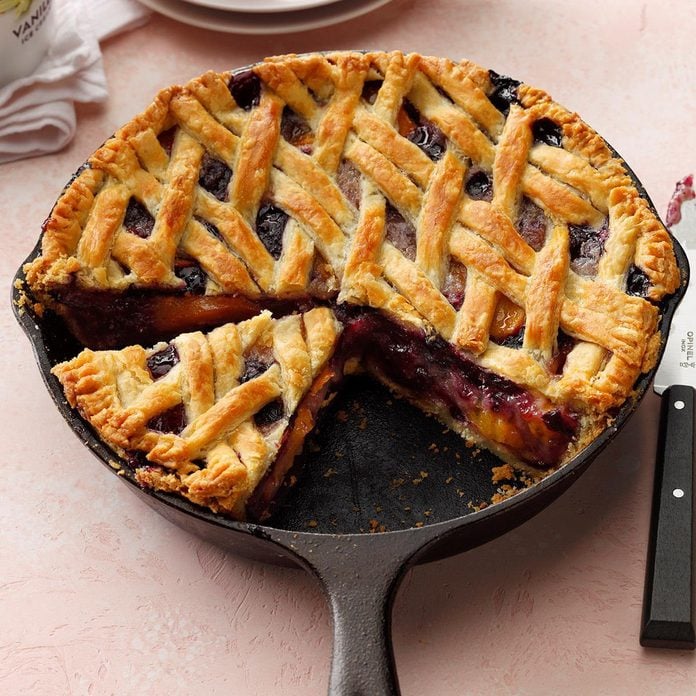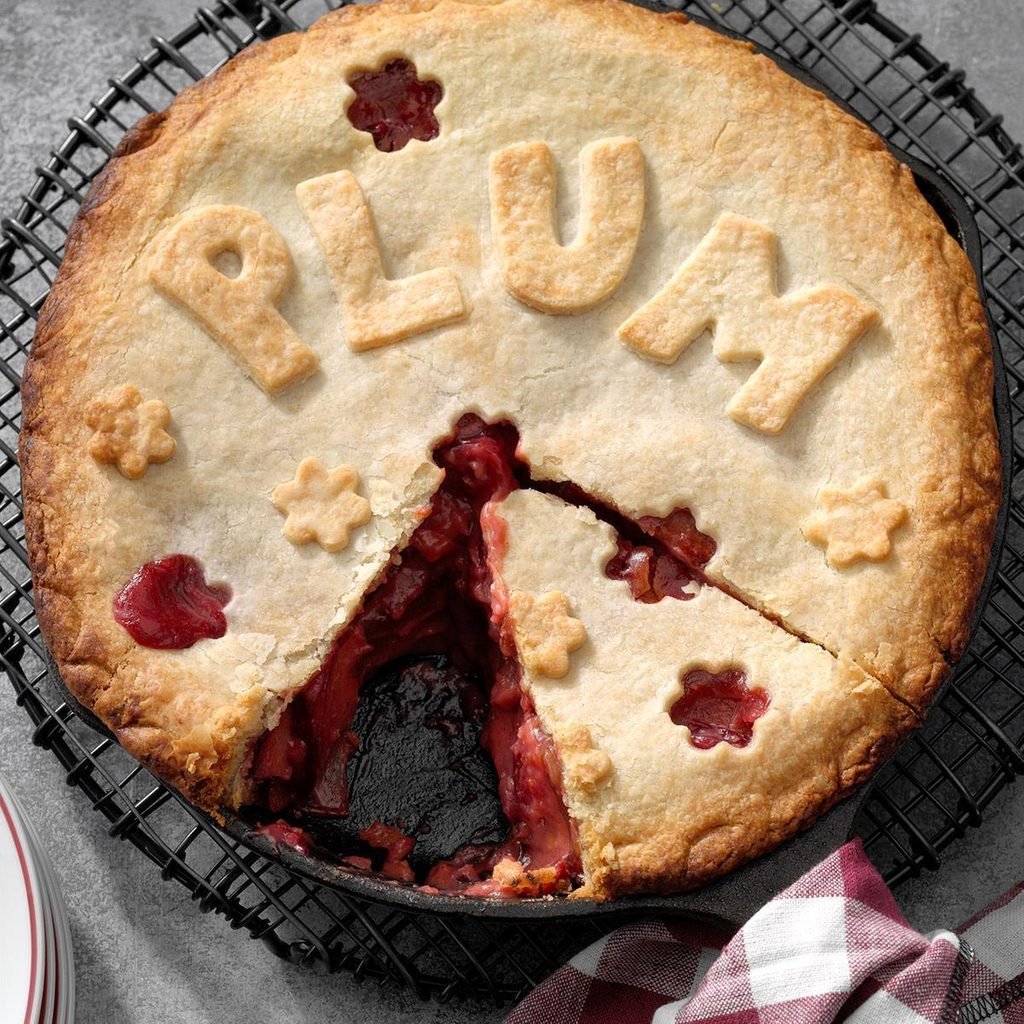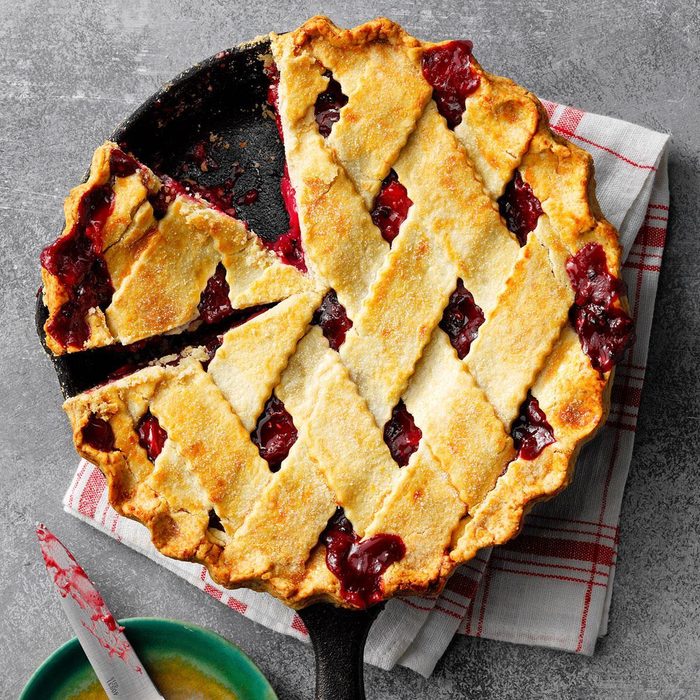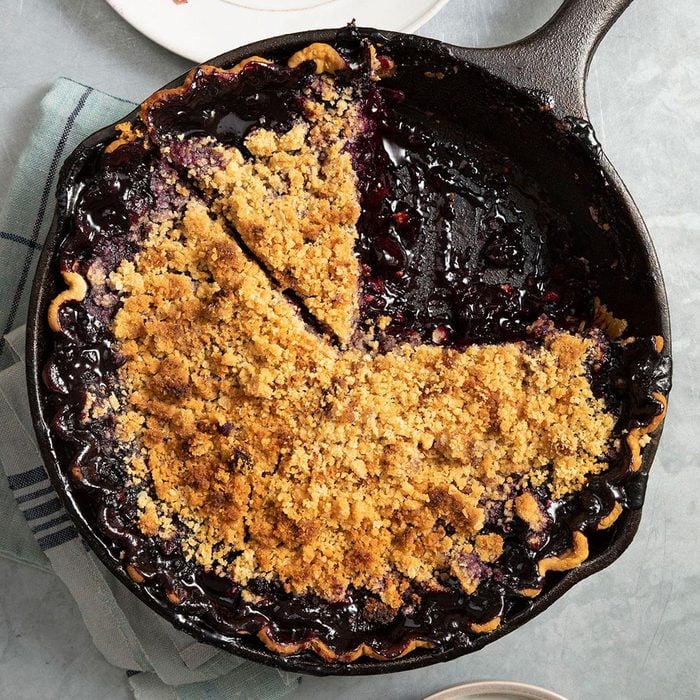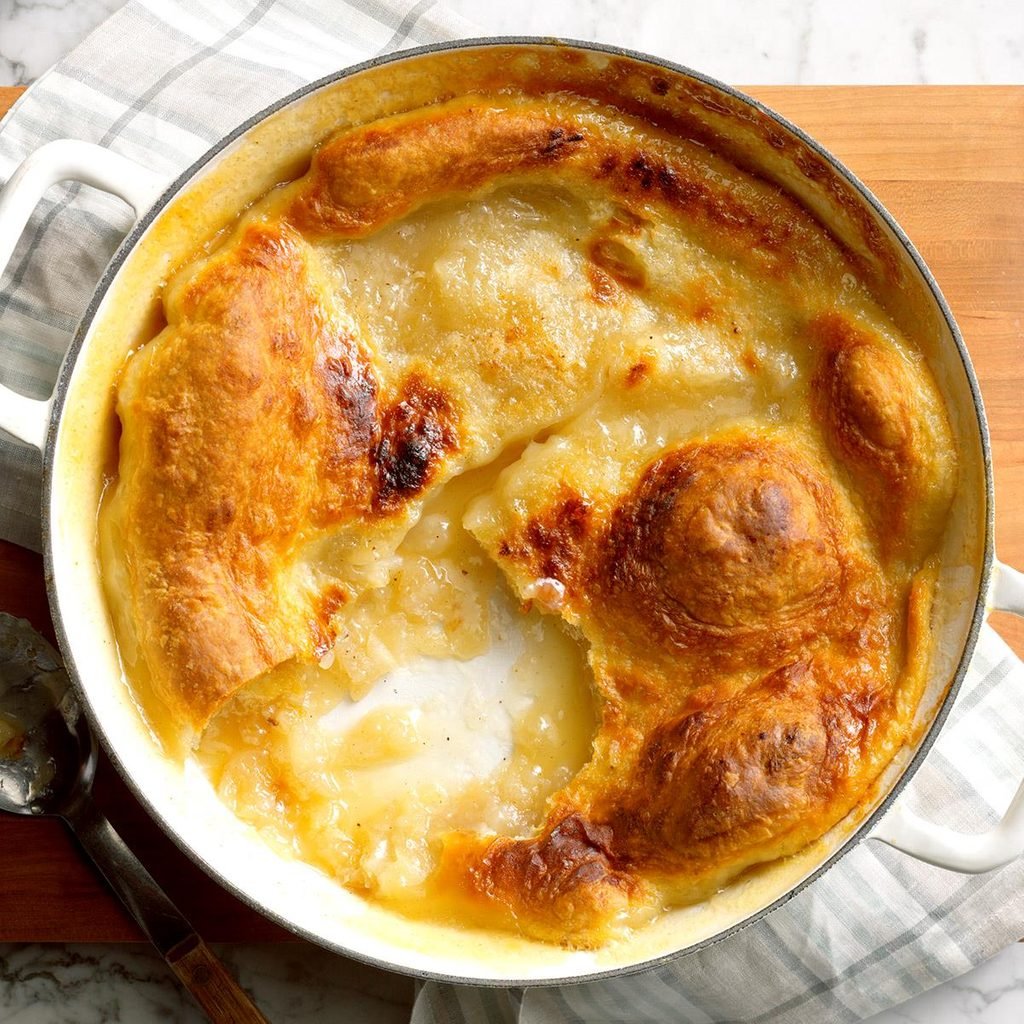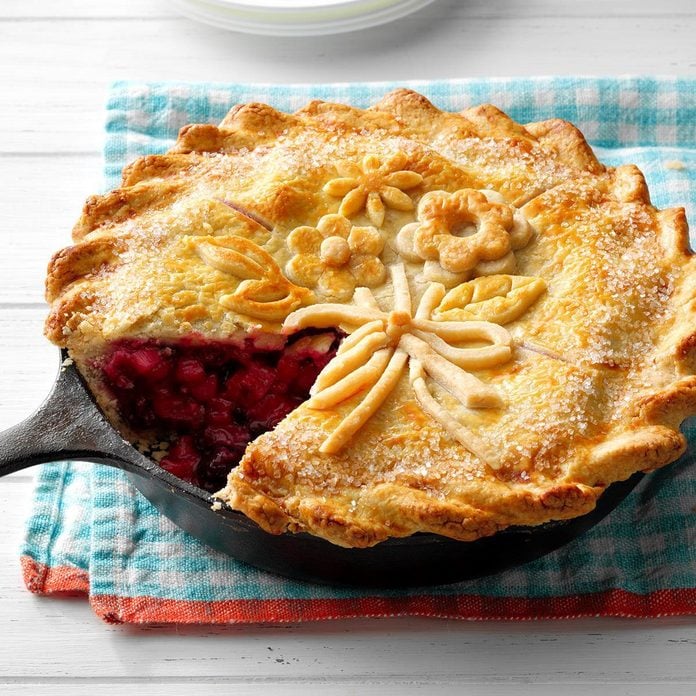A cast-iron skillet is the ultimate kitchen multitasker. I reach for it when I’m craving fried chicken that crackles, toasty grilled sandwiches and even cheesy deep-dish pizzas. But one of my favorite treats to make in cast iron is pie. It’s a surprisingly simple method that yields oh-so-delicious results. Here’s how to bake pie in a cast-iron skillet.
Master cast iron cooking with our guide.
Why Use Cast Iron for Baking?
Cast iron is great for baking because it retains heat and conducts it evenly. Hot spots can occur with glass and ceramic pie plates, but cast iron will give you an even crust, no spots in sight!
It’s also more fun to dig into a cast iron dessert. While classic pie pans are just over an inch deep, your skillet is at least two inches deep. There’s nothing more gratifying than diving in for a big wedge of pie like this Shaker lemon pie. Trust me, your guests will agree.
Make sure you take proper care of your cast iron. Here’s how.
What Pies Can You Bake in a Cast-Iron Skillet?
Almost any pie can be converted to a skillet pie. (But save the icebox pie for your delicate ceramic dishes.) A standard pie pan is a 9-inch round, so your best bet for skillet pie success is with a 9-inch cast-iron skillet. A 10-inch skillet will also work—just make sure you have enough crust to cover the bottom and sides. Any larger and your bake times will be off, resulting in burnt crust or underdone filling.
How to Layer Crust into a Cast-Iron Skillet
Speaking of crust, I mentioned before that cast-iron skillets are deeper than a typical pie dish, meaning you’ll need more crust to cover the bottom and sides of the pie. Our Test Kitchen’s best advice is to make a batch-and-a-half of your go-to pie crust.
Then roll out about 70% of your crust for the bottom and place it in the skillet, being sure that the crust comes up about three-quarters up the sides. Then, cut off any excess and combine that with the remaining 30% for your top crust.
The final crust adjustment comes when placing the top over the filling. To avoid burning, make sure all of the crust stays inside the skillet, including any fancy pie crust designs.
How to Bake Pies in Cast-Iron
When it comes to baking, place your skillet on the very bottom rack of the oven. Being closer to the heat source allows the cast iron to absorb it easily and bake your pie beautifully. Bake times and temperatures will remain the same as the original, but make sure to check on your pie and pull it when the top crust is golden brown.
Serve the pie in the skillet on a pretty trivet for a beautiful, rustic dessert. I’m getting major Joanna Gaines vibes!
Try These Cast-Iron-Baked Pies
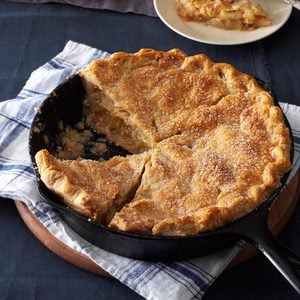 Cinnamon-Sugar Apple Pie(181982)
Cinnamon-Sugar Apple Pie(181982)
It doesn't get cozier than this
cast-iron pie! Cinnamon and apples come together to make this stunner. This beautiful apple pie with its flaky, tender crust also works in a 9-inch deep-dish pie plate. —Renee Schettler Rossi, New York, New York
Go to Recipe
Shaker Lemon PieUse your cast-iron skillet to make pies like this Midwestern favorite. Shaker lemon pie, sometimes called Ohio Shaker pie, makes use of whole lemons to produce a tart pie that lemon lovers won't be able to resist. —Deb Perry, Traverse City, Michigan
Macaroon Cherry PieIn summer, I use homegrown cherries in this amazing pie with a crunchy coconut topping. But canned tart cherries yield a dessert that’s almost as delicious. I always bake this pie around Presidents’ Day or Valentine’s Day, but it’s popular with my family the whole year through. —Lori Daniels, Beverly, West Virginia
Classic Sweet Potato PieThis simple but special deep-dish pie provides a down-home finish to hearty autumn meals served at home. Pecans and pumpkin-pie spices make this a comforting seasonal classic.—Paul Azzone, Shoreham, New York
Peach PieI acquired this delicious peach pie filling recipe some 40 years ago, when my husband and I first moved to southern Iowa and had peach trees growing in our backyard. It's been a family favorite since then and always brings back memories of both summer and those happy early years. — June Mueller, Sioux City, Iowa
Caramel-Pecan Cheesecake PieIn fall or any time of year, this nutty, rich and delicious pecan pie recipe is one I am proud to serve. While it seems very special, this caramel pecan cheesecake is a snap to make. —Becky Ruff, Monona, Iowa
Cast-Iron Cherry-Berry Peach PieI had an overabundant supply of cherries one year, so I adapted several recipes to use them up. I knew this one was a keeper when I received phone calls from my mother and grandmother complimenting me on this pie. —Amy Hartke, Elgin, Illinois
Spiced Plum PieThe subtle tastes of orange and nutmeg bring out the fresh flavor of plums in this comforting pie. Be sure to have a slice while it's still warm, with a scoop of vanilla ice cream. —Lucille Mead, Ilion, New York
Berry-Apple-Rhubarb PieI make this family favorite every year for a gathering at my sister's, where the recipe is known as "Uncle Mike's pie." I use only fresh berries, apples and rhubarb that I grow myself. —Michael Powers, New Baltimore, Virginia
Maine Blueberry Pie with Crumb ToppingCast-iron pies are just more delicious when made with rustic ingredients like hand-harvested Maine berries. The shortbread topping on this dessert adds a sweet crunch. — Jessie Grearson, Falmouth, Maine
Grandma Pruit’s Vinegar PieThis historic pie has been in our family for many generations and is always served at our get-togethers. —Suzette Pruit, Houston, Texas
Bluebarb PieIf you're a fan of strawberry-rhubarb pie, you'll want to try this twist on the classic. Here, blueberries provide the sweet counterpoint to the tart rhubarb, with mouthwatering results. —Steve Gyuro, Franklin, Wisconsin
